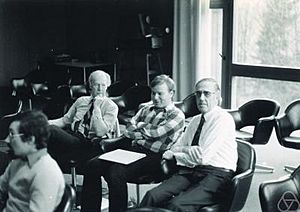Edmond Malinvaud facts for kids
Quick facts for kids
Edmond Malinvaud
|
|
|---|---|

Edmond Malinvaud (right), next to Yves Balasko (center) and Gérard Debreu, in 1977
|
|
| Born | 25 April 1923 Limoges, France
|
| Died | 7 March 2015 (aged 91) Paris, France
|
| Nationality | French |
| Institution | Collège de France |
| Field | Macroeconomics |
| School or tradition |
Walrasian economics |
| Alma mater | Ecole Polytechnique |
| Influences | Léon Walras Maurice Allais |
Edmond Malinvaud (born April 25, 1923 – died March 7, 2015) was an important French economist. An economist is someone who studies how countries and people use their money and resources. He was the very first president of a special group called the Pontifical Academy of Social Sciences.
Contents
Early Life and Education
Edmond Malinvaud studied at two famous schools in Paris, France: the École Polytechnique and the École Nationale de la Statistique et de l'Administration Économique (ENSAE). He was a student of another famous economist, Maurice Allais.
In 1950, Malinvaud went to the United States to join the Cowles Commission. This was a research group where he did a lot of different work.
Key Ideas and Contributions
Malinvaud made many important contributions to economics.
Capital and Efficiency
One of his famous early works was about "Capital Accumulation and the Efficient Allocation of Resources" (1953). This paper looked at how money and resources should be used over time to get the best results. He introduced the idea of dynamic efficiency. This means making sure resources are used well, not just now, but also in the future.
Understanding Uncertainty
He also studied uncertainty theory. This is about how people and businesses make decisions when they don't know exactly what will happen in the future. For example, what if the economy changes unexpectedly?
Famous Textbooks
Malinvaud wrote two classic textbooks that many students have used:
- Lectures in Microeconomic Theory: This book explains microeconomics, which is the study of how individuals and small businesses make choices.
- Statistical Methods in Econometrics: This book teaches econometrics, which is about using math and statistics to understand economic data.
Macroeconomics and Unemployment
One of Malinvaud's biggest contributions was to macroeconomics. This is the study of the economy as a whole, including things like unemployment and national income. In his 1977 book, Theory of Unemployment Reconsidered, he explained how economies can get stuck in situations where there aren't enough jobs. He showed how the economy works when things aren't perfectly balanced. His ideas greatly influenced many economists in Europe.
Career Highlights
Edmond Malinvaud held several important positions during his career:
- He was the director of ENSAE (1962–1966).
- He led the forecast department of the French Treasury (1972–1974).
- He was the director of INSEE (1974–1987), which is like the national statistics office in France.
- He became a professor at the Collège de France (1988–1993), a very respected teaching and research institution.
See also
 In Spanish: Edmond Malinvaud para niños
In Spanish: Edmond Malinvaud para niños
 | Bayard Rustin |
 | Jeannette Carter |
 | Jeremiah A. Brown |

